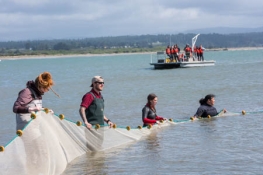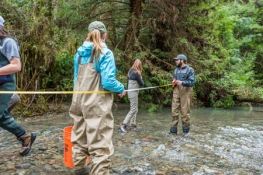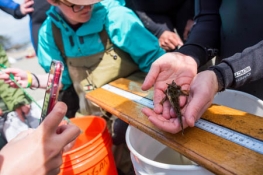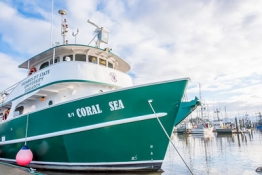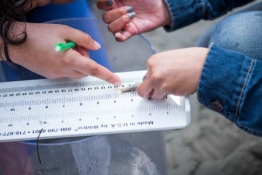Academics & Options
Fisheries Biology classes are just the beginning—our resources and hands-on learning opportunities put you in the field and ultimately in a position for a fulfilling career.
Our program's mission is to provide our majors with the knowledge, skills and motivation required to ensure the conservation of fish and aquatic resources that are faced with increasing societal demands and increasing loss or degradation of habitat.
We stress development of a field-based understanding of the relationships between freshwater and marine fishes and the habitats upon which they depend, but our program is broad enough to provide specialized training in fish population dynamics and fishery management, restoration ecology, systematics, marine and freshwater aquaculture, fish health management and water pollution biology. Each of these specialized areas within the broader fisheries field has its own important role to play in the overall conservation of fish and aquatic resources. Our goal is to help students appreciate the roles that their chosen disciplinary specializations contribute to this overall conservation objective.
Catalog Information
Concentrations
Student Learning Outcomes
Fish Ecology Skills
Describe how physical and biological factors of aquatic ecosystems determine the distribution and abundance of fish populations and pose testable hypotheses and experiments to identify specific factors that constrain population growth or distribution.
Fisheries Techniques Skills
Select and implement basic data collection protocols appropriate for characterizing status of fish communities, including assessment of species composition, abundance, and population structure (age, size, genetic).
Communication Skills
Convey scientific concepts in written, oral, and visual communication formats, including following basic guidelines for format and structure of scientific reports, papers, or presentations.
Quantitative Skills
Describe and explain how fisheries management problems can be expressed as mathematical/numeric/statistical models, produce useful tabular and graphic summaries of quantitative data, and conduct simple tests of statistical hypotheses.
Fisheries Management Skills
Describe the scientific, legal, political, and social factors that determine goals for fisheries management and conservation, and identify appropriate management strategies that can be used to achieve these goals.
Critical Thinking Skills
Critically evaluate your own fisheries work as well as fisheries data, information, and conclusions reported in published peer-reviewed literature, unpublished technical reports, and popular media.

